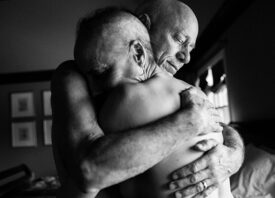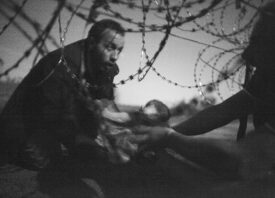Search this site
We Asked 19 Photographers: ‘Would You Ever Work For Free?’

Nancy Borowick for The Touch A Life Foundation
Nancy Borowick: I’ve certainly snapped a few friends’ head shots for a bottle of wine here and there, but generally, no, I would not work for free. Starting out, I took a few small jobs for pretty much pennies, but I also had no work to show in my portfolio, so who was going to hire me with no experience? I was in Ghana years ago, when I was still very much an amateur photographer and had been working on my own project when I came across an organization that worked with trafficked children. I fell in love with the children immediately and wanted to help raise awareness for this program. I asked if I could photograph the children and get to know them, and I ultimately shared those images with the org free of charge. They didn’t pay for the images, but I not only took advantage of the opportunity to shoot and connect with a this cause now dear to my heart; I was able to build up my body of work and prove to the org that I could be an asset. Since then, they have hired me and flown me back to Ghana numerous times. I think you have to make smart decisions about how you charge and your relationship development with clients.
Seth Casteel: My entire career is based on working for free. I started out as a volunteer photographer at animal shelters which led to a part-time gig as a lifestyle pet photographer. My general advice on working for free is that there are situations where it absolutely makes sense, but as a full-time photographer, you have to be careful to find a balance between paid gigs and non-paid since you have bills to pay. But there is no question that working for free has unexpectedly opened many doors for me.
Peter Dench: I’m answering these questions for free, which is beginning to feel like work in contrast to the sound of tinkling of wine glasses from the bar opposite.
In terms of providing a service as a photographer, I would never work for free. Personally, I think it’s an insult to my profession, colleagues and family. I understand the argument and that the decision, particularly for those starting out in the profession, can be a tricky one, but it must be up to the photographer to say “NO! I have a skill and that skill has a value.” The photographic industry must unite to end unpaid work and send a message to those who are culpable that there must be change; as long as photographers keep saying yes to unpaid work, the question will continue to be asked for them to do so.
Carolyn Drake: When I work for myself, it’s usually for free. Sometimes I’ll offer pictures as barter, or as an exchange, but I usually try to avoid offering free labor. You need money to live.
Ayesha Malik: I am slightly nervous answering this one because photography can be a career path for people, their way to survive in this world, and they should absolutely get paid for all they have to offer. On that note, yes, I would work for free, under certain circumstances. To me, some experiences are worth so much more than any paycheck will ever offer. If someone told me they could provide me with the tools and access needed to pursue a project (only if it was the kind of project that would keep me awake at night), but they could not pay me for it, I would easily say yes. It is safe to assume such chances do not come along all that often.
Ed Thompson: I help my mum in the garden. I don’t charge her for that. I don’t think you should work as a photographer for free ever, as you are messing with everyone else. To some people photography isn’t worth a penny, but to me photography is my life. My life is worth something, at least to me, so that’s why I get paid and I am a professional photographer.
Yana Paskova: Nearly never. Certainly there are times when photography is something that can be gifted – to family or close friends, if one chooses – but in most cases, offering photo services for free lowers the standard of pay in an already undervalued profession, and certainly does not support our equipment renewal, pursuit of personal projects, and health and dental insurance – all crucial elements of a freelance photographer’s career, expenses for which we must shoulder on our own.
J.M. Giordano: Yes. I take on two pro bono shoots a year for non-profits. It keeps the Karma points up. Other than that, no. Photographers should be paid for their work like anyone else. I’m seeing a slight shift in this climate with the younger photogs who intern for me. They refuse to work for free. Which is a great thing.
Michael Lavine: I’m happy to work for free, as long as I can do whatever I want.
Renée C. Byer: That’s an interesting question because I don’t think photojournalists are ever compensated fully for the amount of time they spend with their subjects. Although we may be paid by a newspaper, agency, and magazine or nonprofit, it seems we always donate time back and part of that could be considered working for free. I spend an enormous amount of time with my subjects to gain their trust and connect on an intimate level. I don’t work for free because it sets a bad precedent in the industry. I’m on a staff and I get paid a salary, so I don’t have the concerns that struggling independent photographers have.
Wasma Mansour: I think this will depend on who is commissioning, their circumstances and whether I am keen on the project.
Cristina de Middel: Yes, I have worked for free many times, but I was always getting something in exchange. It is not only about money. Many times you get experience, access or exposure for things you do for free, and that is even more valuable for me at this point. I worked for free with NGOs for many years, and think I would still do it if I had time now. I also worked for free at the beginning of my career when I was trying to start working for newspapers in Spain, but I was really learning, so I guess I was the one getting something for free: experience.
Laura Pannack: I don’t believe in being taken advantage of, but equally I don’t think finance is the only reward of a commission. I’m currently working on a project for free, as I know I will learn a huge amount, and it will give me the opportunity to collaborate with someone I’ve wanted to work with for a long time.
David Pace: I often work for free. All of my most significant projects have resulted from volunteer work. I first went to West Africa to photograph for “Friends of African Village Libraries,” a non-profit organization that promotes literacy in rural villages. That job introduced me to the village of Bereba in Burkina Faso, where I have been photographing annually for nearly ten years. I was teaching photography at Santa Clara University at that time. I helped to create a study abroad program in West Africa and was hired by the university to be the resident director. That allowed me to spend 10 weeks each year in Burkina Faso and get paid for it. I also work for free, in a sense, in the village because I give away prints of all of the portraits I take. This has created a deep and lasting relationship between the villagers and myself. I could not do the work I am exhibiting today without the trust of the villagers.
Molly Landreth: Although I do love being able to pay my mortgage, I will absolutely work for free, or almost free, if it’s the right job. Some of my favorite shoots turned out great because the client couldn’t pay anything and so in return I gained more creative freedom. Those jobs are few and far between, but sometimes they pay off 10 fold in the long run.
Benjamin Lowy: Hmm. That’s a tough one. It’s never a great idea to work for free – but in return for certain kinds of access that would otherwise be impossible, it might be worth it. But then again, half my time in Iraq was spent on spec, trying to pick up jobs, which is working for free I guess…
Ron Haviv: I have worked for free many, many times. More often than not, it’s been on stories that I believed needed to be told but I could not get any financial support from a client. Other times, I have been asked by NGO’s that I respect and want to support if I could work for them for the good of the story.
Bieke Depoorter: Yes, If it’s an organization that does not have money and something that I really support. But in general, I do not like people that expect photographers to give their work for free.
Martin Usborne: If it was for a charity I supported or was hugely beneficial to my portfolio. On the whole, though, I don’t like magazines or companies that take advantage of young photographers’ desire to be seen at all costs – or rather at no costs.



